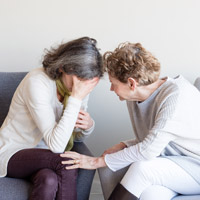I've got another 'keen'... Ouch!

How to talk to your grandchild about a death in the family

Bereavement can be overwhelming and knowing how to help someone through it isn’t easy. If you and your grandchild are both grieving, you might feel you need to be stoical to support them, or find that focusing on them rather than your own feelings is easier at times. However, it’s important to make sure you’re both getting the help you need. So what can you do to best support your grandchildren and yourself in this situation? Here's some advice from Independent Age.
Sign up to Gransnet for more support and advice
1. Talk openly and honestly about the death
If you have both been bereaved, allow yourself to grieve and comfort each other. Your instinct may be to stay strong for the sake of your grandchild, but this isn’t always helpful. Children may mimic this behaviour, and if neither of you are talking about how you feel, it can be hard to move on. Let your grandchild show their emotions – there’s no one way of grieving and there's no set time it will take for them to feel more like themselves again.
It’s also best to avoid euphemisms, which can be confusing for children. Use words like death and died, rather than saying you’ve lost someone or they’ve gone to sleep. Young children think literally, so choice of words is important. It’s helpful to explain the cause of death clearly and simply, rather than leaving them to guess.
2. Remember the person who has died
It can be helpful to everyone to talk about the person who has died, even if it might be hard to do. It’s especially important to children to do this. This helps them to maintain a connection to the person. Encourage your grandchild to talk about how they would like to remember the person. They might want to make a memory box or plant the person’s favourite flower or tree in their memory.
3. Seek support
If you think you or your grandchild could benefit from talking to someone outside of the family, you might want to speak to your GP. They can keep an eye on your health and provide reassurance, and may refer you for therapies, such as grief or bereavement counselling. You could also consider private counselling as an alternative.
Some charities and other organisations specialise in bereavement support. Winston’s Wish provides support and information to bereaved children, and Cruse Bereavement Care has a dedicated website for young people called Hope Again. The Compassionate Friends supports families after the death of a child of any age and has a helpline staffed by bereaved parents.
4. If your adult child has died
If your adult child has died, this is a devastating loss in itself. But if they have left behind a young family, this can make things more complicated. For example:
- Other people may focus on the partner and children of your child, rather than on how you’re coping as a bereaved parent.
- You may feel you need to put on a brave face to help your grandchild, and not allow yourself to grieve.
- You may need to take on a parental role towards grandchildren, if a surviving parent has to return to work or there is no surviving parent.
- You might feel guilty that you have outlived your child, particularly when they have a family of their own.
Make sure you’re looking after yourself and getting the support you need, even if you’re supporting other family members. The Compassionate Friends has advice on coping with the death of an adult child.
5. Share your memories
You have known your child all their life, so you’re well placed to share stories of them. If your grandchild’s surviving parent finds it hard to talk about the person who has died, you can help grandchildren to hold on to memories of them.
6. Avoid conflict
This can be easier said than done. Families sometimes find themselves arguing after a death. Everyone copes with grief differently and anger and irritation are common. The need to sort out practical matters can also increase the strain. Even if your child is survived by a partner you’re not on good terms with, try to remain uncritical and communicate with them effectively.
7. Keep in touch
If you don’t live near your grandchildren, you might find it hard to visit them often. Be inventive – write letters, phone, text, email, or use Skype or social media. You’re an important link to their parent who has died. Sadly, people do sometimes lose touch with their grandchildren if one parent dies. If this happens, it’s best for everyone if you try to resolve it informally by speaking to the surviving parent. Grandparents Plus has more advice on what how to do this.
Remember, help is available to you and your grandchild. Family, friends, medical professionals, charities and groups can all lend support. For more information on living with grief and loss, read Independent Age's guide to coping with bereavement and visit their website to find out more about their new campaign, 'We need to talk about death'. Also, join the Gransnet bereavement forum for support and advice from other grandparents.
Images: Shutterstock


